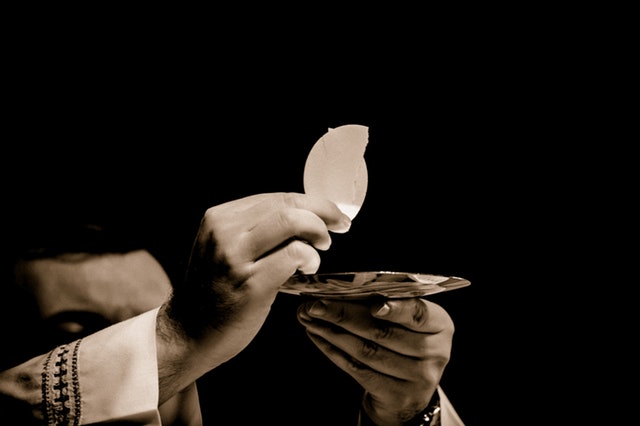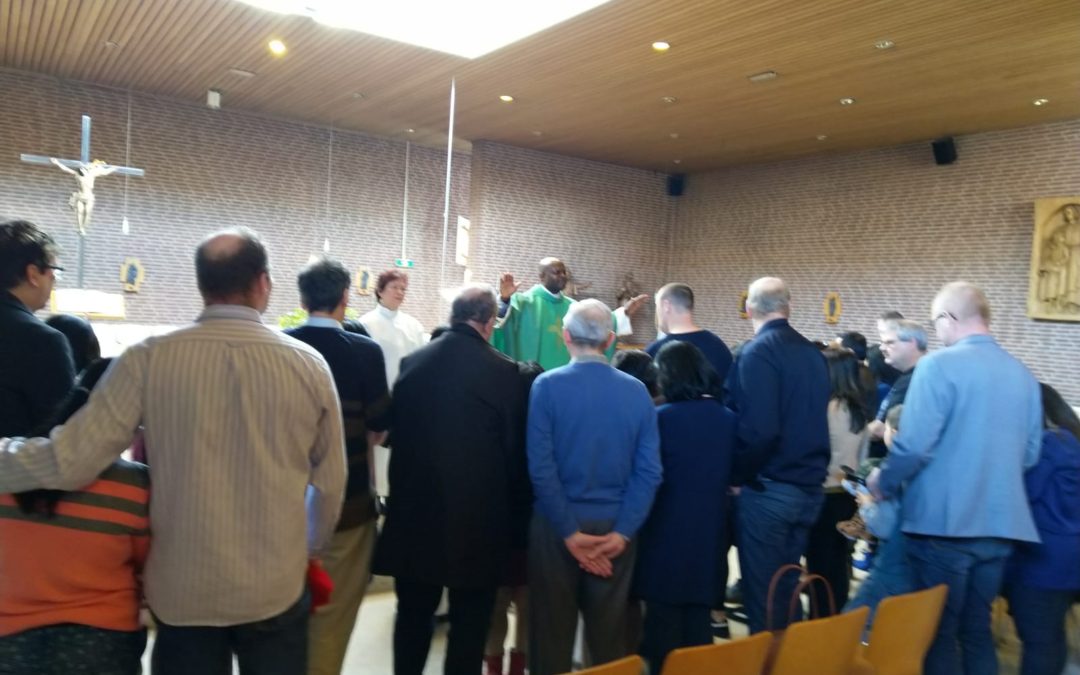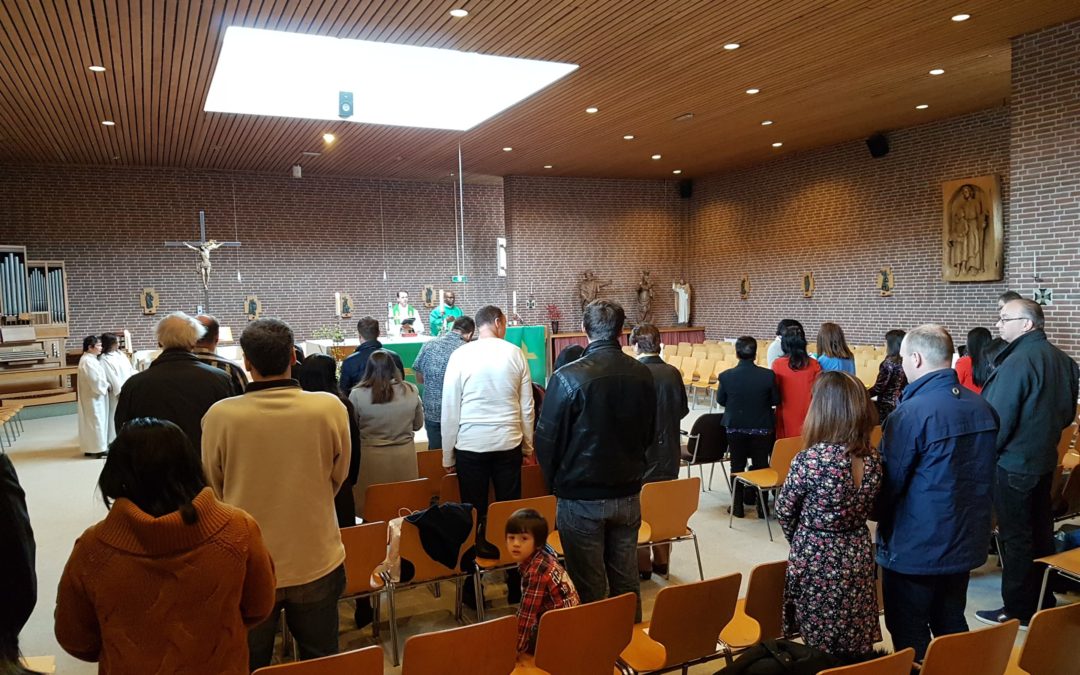
Jun 23, 2019 | Homily
By Fr. Marcel Uzoigwe, CSSp.
Today, the universal church celebrates the Solemnity of the Body and Blood of Jesus Christ. This feast was established and extended to the Universal Church by Pope Urban IV in 1264 to celebrate the Real Presence of the Body and Blood, Soul and Divinity of Jesus Christ in the elements of the Eucharist. During the Last Supper, while at table with his disciples, Jesus took bread, said the prayers, broke it and gave it to his disciples saying: take this all of you and eat of it, for THIS IS MY BODY. The same he did with the wine saying: “THIS IS MY BLOOD”. He then commanded them to “do this in memory of me.” These same words are repeated by the priest during consecration because the Eucharist is NOT a symbol of the Body and Blood of Jesus Christ but the REAL presence of Jesus Christ.
Jesus makes the most perfect gift of himself to us in the Eucharist out of his love and desire to be intimately united with us at all times. Love manifests itself in giving, and the greatest gift is that of oneself. The readings of today deal with the subject of giving or offering of something. The first reading related the encounter of Abram with Melchizedek on his return from a victorious battle. Abram offered a tenth of all his spoils to the priest of the Most High God, Melchizedek, who blessed him. Melchizedek in turn offered bread and wine in thanksgiving to God on behalf of Abram. The offering of bread and wine foreshadowed the event of the Eucharist which Jesus, the perfect high priest of the new order, offered for the salvation of mankind.
The Gospel reading touched on the same theme of giving without counting the cost, a symbol of boundless love. Having taught the people for several days, Jesus felt their physical hunger and lack of bread. Rather than sending them away to go and fend for themselves, he decided to do something instead, to find a way to feed them. Jesus had no bread himself. John’s account of this event (John 6: 9) has it that there was a young boy with five loaves and two fish, and was willing to offer them up for the good of everyone rather than focus on his own personal need for them. Jesus took the bread and fish, said the prayers and set them before the people. What could not be enough for a few persons was sufficient to feed over five thousand men and twelf baskets of leftover were gathered afterwards. The extent to which true charity can go is unfathomable. That is why it is more blessed to give than to receive (Acts. 20:35).
Aware of the constant human weaknesses and spiritual poverty, Jesus freely offers himself to us in the Eucharist, in such an unconditional love that the human mind can hardly grasp. He invites us to eat of him who is the true bread that comes down from heaven and gives life to the world (John 6:51). Vatican II in Lumen Gentium 11 declared that the ‘The Eucharist is “the source and summit of the Christian life.”’ The Catechist of the Catholic Church (CCC 136) reaffirms this and added that “The other sacraments, and indeed all ecclesiastical ministries and works of the apostolate, are bound up with the Eucharist and are oriented toward it. For in the blessed Eucharist is contained the whole spiritual good of the Church, namely Christ himself, our Pasch … It is the culmination both of God’s action sanctifying the world in Christ and of the worship men offer to Christ and through him to the Father in the Holy Spirit” (CCC 137-138). In his first letter to the Corinthians, which forms the second reading, St. Paul recounts the event of the Eucharistic celebration as a tradition which he himself received and transmits. The Eucharists became the center of Christian communities that began with the apostles of Jesus Christ and has continued down to our time. It is the command of Jesus himself that we do it in his memory.
The famous Dutch priest, Henri Nouwen, in his teaching on becoming the beloved (https://www.youtube.com/watch?v=3-bGS8sysjY) sought to illustrate how the actions of Jesus in instituting the Eucharist summarise the life of Jesus and that of us all as the beloved of the father. In doing that he virtually used the words of St. Paul in the second reading to illustrate the sequence: Jesus took the bread, said the blessing, broke it and gave it to his disciples. The four words: Taken, Blessed, Broken and Given, according to him, summarize the life we are called to live in the footsteps of Jesus. Jesus, the beloved, unique and anointed son of the father allows his blessed life to be taken, broken to the utmost, and given for the life of the world.
As we celebrate the solemnity of the Body and Blood of Jesus Christ today, let us call to mind the immeasurable gift of himself that Jesus makes to us. A gift that led him to a great suffering and pain, and continues to hurt whenever we abuse his body and blood in the Eucharist. Let us also call to mind that we all, as members of his mystical body – the Church – are called to offer ourselves daily for the good of others. Difficult and painful as this may sometimes be, the Eucharist offers us the spiritual strength to walk in the footsteps of Jesus Christ and make of our lives an offering to God for our brothers and sisters.
(Homily delivered by Fr. Marcel Uzoigwe on 23 June, 2019)

Apr 28, 2019 | Homily
By Fr. Marcel Uzoigwe
Dear brothers and sisters,
Today is the second Sunday of Easter – the Octave of Easter. It is also the day that we celebrate the Divine Mercy Sunday. The gospel narrates the appearance of Jesus to his disciples who were still grappling with the entire events of his death and resurrection. After the crucifixion and death of Jesus, his disciples were devastated; some of them scattered in the confusion that followed. Then came the news of his resurrection. They were still at a loss, especially given the manner the news of the resurrection was filtering in. The Jewish authorities that killed Jesus were still a big threat, and the resurrected Jesus was nowhere to be found. They felt harassed and intimidated, like sheep without a shepherd. All they could do was hide behind closed doors. On the one hand, they were afraid of the Jews that murdered their master. On the other hand, the guilt of having abandoned their master during his most difficult moment was in itself scaring.
In the midst of their confusion, doubt and fear, Jesus appeared to reassure them that he is indeed alive. How very awkward they must have felt as Jesus suddenly appeared in their midst. They must have been afraid too that the moment of reckoning has come; the moment of telling off and dressing down, not only for their cowardly behaviour but also for their lack of faith in him. But instead Jesus pronounced peace on them; they had been unsettled and needed that healing of their guilt and awkwardness. The risen Jesus shows his hands and his side lest they forget what they and the world did to him, but he did not follow with words of rebuke, only words of mercy. He goes further to empower them to become the agents of that healing mercy of God in the world; he breaths on them and says, receive the Holy Spirit, whose sins you forgive, they are forgiven, and whose sins you retain, they are retained.
Jesus’ visit to His disciples was vital to restore their courage and faith, assure them of the veracity of His teachings about His death and resurrection and empower them for the task he was entrusting to them. Doubt and fear can be great obstacles to effective Christian living, limiting the power and courage to engage oneself in Christian witnessing, works of mercy and reaching out to those in need. Jesus’ aversion to doubt could be seen in His somewhat reprimanding words to Thomas who was absent during his first visit, and thereafter had difficulties believing the report of his fellow disciples regarding the appearance of Jesus to them. The Christian faith is obviously not resistant to rational reflection; on the contrary, living faith can only be founded on sound reasoning. But in spite of human reasoning being the starting point to the Christian faith, faith goes further than human reason. Taking human reasoning to be the utmost and the only yardstick for measuring facts leads to denial of whatever that eludes human conception; and there are many of such phenomena such as the resurrection of Jesus from the death. They transcends the sphere of human conception that operates with the attributes of space and time.
During this visit, Jesus greeted his disciples with peace before entrusting to them the specific tasks to forgive every sins. In doing so he opens wide the door to the Father’s boundless heart of love and Mercy. Divine Mercy is manifested in the forgiveness of sins as clearly evident in the events of today’s Gospel. Love, mercy and forgiveness naturally lead to peace. When we learn to love, it becomes easy to have mercy, to forgive and to experience lasting peace. It is only then that we can take the extra steps to reach out to others. Today, Jesus reassures us of his living presence with us and invites us to approach his throne of mercy, experience his love and forgiving heart (also in the confessional), and to become agents of love, mercy and forgiveness.
One can then understand why the celebration of the Divine Mercy has been placed on the Octave of Easter. During the 30th April 2000 (Sunday after Easter) canonization of the Polish nun, Sr. Faustina Kowalska who died in 1938, Pope John Paul II designated Sunday after Easter as Divine Mercy Sunday. Sr. Faustina was gifted with extraordinary visions and experiences of the Lord Jesus. The most famous of these was the Lord revealing his sacred heart from which came rays of light, red and white which she interpreted as the radiating forth of the Divine Mercy. Following the revelations Our Lord gave to Sr. Faustina, Jesus promised to grant forgiveness of all sins and punishment, even to the most hardened sinners who turn to ask for God’s mercy, especially on the Feast of Divine Mercy.
The message of the resurrected Jesus finds expression among his disciples in the signs and wonders that were being done through them among the people. The first reading reports that there is something that can be seen and verified in the Christian community born of faith in the risen Lord. It is the completely new kind of life that is being led in these communities that testifies that Jesus is alive and that he has sent his Spirit into the world. In the early times of the Church, Christians needed no identification badges because the fruits of the Holy Spirit (Galatians 5: 22-23) were evident in their lives and the communities they formed. Acts 4:32 described the interpersonal relationship among them as being united in “one heart and one soul”.
As we celebrate the Divine Mercy Sunday on this Second Sunday (Octave) of Easter, it is important to review to what extent we ourselves and our community mirror the merciful heart of Jesus: a heart of love, care and forgiveness. It is amazing to note that given the absence of Thomas during the first visit of Jesus to His disciples, Jesus had to repeat the visit to personally convince Thomas the he has indeed risen from the dead. That is in itself an invitation to imbibe the Good Shepherd’s attitude in reaching out to our brothers and sisters, even when they seem unwilling to cooperate. Jesus comes to us in a very special way during every Eucharistic celebration. We pray that as he comes today, he may find us -individually and collectively – as true agents of his love, mercy and forgiveness to the world around us.
As we celebrate the Divine Mercy Sunday on this Second Sunday (Octave) of Easter, it is important to review to what extent we ourselves and our community mirror the merciful heart of Jesus: a heart of love, care and forgiveness. It is amazing to note that given the absence of Thomas during the first visit of Jesus to His disciples, Jesus had to repeat the visit to personally convince Thomas the he has indeed risen from the dead. That is in itself an invitation to imbibe the Good Shepherd’s attitude in reaching out to our brothers and sisters, even when they seem unwilling to cooperate. Jesus comes to us in a very special way during every Eucharistic celebration. We pray that as he comes today, he may find us -individually and collectively – as true agents of his love, mercy and forgiveness to the world around us.
(Image source and caption: Wikipedia– The Divine Mercy Shrine in El Salvador City Misamis Oriental, Philippines.)

Mar 24, 2019 | Homily
By Fr. Marcel Uzoigwe, CSSp. | Homily 3rd Sunday of Year Lent C
You may have experienced occasions when misfortune befalls those considered to be evil in the society and instead of being pitied, the dominant response you hear is something like, “that serves them right”, “good that they received what they deserve” or even “thank God for the evil that befell them”. We may have even said that one or more times. That is precisely the attitude displayed by the people who came to Jesus with the news of the slaughter of the Galileans by Pilate in this Sunday’s Gospel reading. We have witnessed a number of disasters and bloody killings in recent times: the Ethiopian flight disaster, the killing of Muslims in New-Zealand, the Mass killing of Christians by Muslims in Northern Nigeria, the horrible natural disaster of the Tropical Cyclone Idai in Mozambique and the Eastern borders of Zimbabwe and Malawi, etc. Could we say that the fate these victims met is a consequence of the sins they committed? No… not in any way. Any such condemnatory attitude embodies some level of self-justification and “better than thou” notion of self as against the victims of these disasters.
Jesus was clear with his rejection of such attitude in his response to the people who brought him the news of the disaster that befell the Galileans: “Do you think that because these Galileans suffered in this way, they were worse sinners than others? No, I tell you; but unless you repent, you will all perish as they did.” Similarly, about the eighteen who were killed when the tower of Siloam collapsed on them Jesus queries: “Do you think that they were worse offenders than all the others living in Jerusalem? No, I tell you; but unless you repent, you will all perish just as they did.”
The only good that misfortunes serve is the lesson we learn from them to ensure that such never repeats again. In the gospel, Jesus utilized the occasion to teach on the uncertainty of life; the necessity of being vigilant; of not being overly attached to that which we might easily lose at any moment. He noted that it could happen to anybody, and that if they don’t happen to us at this time, it is because of God’s mercy and love not because of what we deserve. It is the grace of God that keeps us alive and enables us to advance in our undertakings; and that grace must not be taken for granted or abused. Thus, the right attitude of living by the grace of God should rather help us to make the best of the opportunity God gives us everyday to make amends and become better human beings. Lent is a grace period to reflect on our lives and seek to understand the aspects of our life that God is calling each of us to pay closer attention to so as to become holy and ready for every good works He wishes to entrust into our hands. So, instead of wasting our limited time standing in judgment over those whom misfortune has befallen, such times should more wisely be invested in responding to the invitation from God to humble repentance and good works before our time on earth runs out.
Saint Paul echoes this warning in the second reading by calling on the Corinthians to learn from the misfortunes of their forefathers who were cherished by God but failed to utilize the opportunity given to them. His warning stems from the story of the liberation of the Israelites from slavery in Egypt which we find in the first reading. God took the initiative, having seen the affliction the people suffered in the hands of the oppressors. He chose a man called Moses who himself was forced to run for his dear life when his personal attempt to save his people hit the rock. He had killed an Egyptian oppressing an Israelitan, who later betrayed him by not keeping the secret (Exodus 2: 11-22). He was uncertain what his return to Egypt would have in stock for him. Despite being betrayed by the very person he fought to save, he needed to put behind the past and focus on the new creation that God was making of him and undertake the unsavoury task of going to speak to the Israelites about God’s decision to set them free from the Egyptians. When God revealed his name “I AM WHO I AM”, Moses realized that what his human effort could not achieve is possible with the divine presence and support. He only needed to make himself available and God will do the rest through him. Saint Paul noted that the people failed to maintain faith in the God who liberated them out of slavery in Egypt, and therefore many of them died without reaching the promised land. We, therefore, need to be careful not to misuse the opportunity the grace of God offers us for repentance and reconciliation.
Dear Friends, the urgency for repentance, reconciliation and gratefulness to God for his graces are the themes that run through the entire readings of today. That is to be expected given that Lenten period encouraged reflection in this necessary direction to salvation which is a core value of Christ’s death on the cross. Repentance and reconciliation are intimately intertwined. Repentance is possible because God is offering us reconciliation, and being reconciled with God involves the commitment to a new style of life and building the new creation made available in Christ. The parable of the fig tree that follows Jesus’ rebuff to the idea of misfortune as punishment in the gospel of today brings out the fact that God continually offer us the possibility of repentance. Honest repentance goes beyond mere words or emotional acts of sorrow for offenses committed to include evaluating our lifestyles, actions and attitudes. The call to repent is the call to turn over a new leaf, to begin afresh; reconciliation is the fruit of this turning around and links the personal new beginning with the work of the whole body of Christ to establish the kingdom of peace and love.
Call to mission follows genuine repentance. What God has done for us, we seek to extend to others through various forms of ministry (service) to them. God would not allow Moses to remain with the new life he had found in Midian but sent him back to extend liberation to his own people. Moses returned to Egypt, no longer as the carnal man with natural powers to fight for the liberation of the Israelitans but in the power of God. We need not be afraid to make ourselves available for whatever God calls us to do that will bring His love to those around us. God’s grace is ever sufficient for us. St. Paul, who experienced the power of God in the midst of hardships he endured during his missionary engagements, wrote in Romans 8:37 that in all things we are more than conquerors through Him (Christ) who loves us, and Philippians 4:13 that he can do all things by the power of Christ who is his strength. This is sufficient assurance of what God can do in us when we repent and reconcile with Him and with one another. May His grace lead us to answer His call this Lenten session. Amen.
Reading 1, Exodus 3:1-8, 13-15
Responsorial Psalm, Psalms 103:1-2, 3-4, 6-7, 8, 11
Reading 2, First Corinthians 10:1-6, 10-12
Gospel, Luke 13:1-9

Feb 28, 2019 | Homily
Dear friends in Christ,
The readings bring us to the very important theme of forgiveness. The whole issue of salvation is anchored on a forgiving God who seeks out his sinful children. The old testament is filled with God who relates with consistently disobeying people. Sometimes God allows them to suffer a little bit of the consequences of their wrong choices in a bid to make them reason differently before coming to their help. But the compelling picture of God in the relationship is that of a loving father tending his weak children, leading them to a better understanding of who they are as his children. Little wonder we say that to err is human, but to forgive is divine.
In the first reading, we see David who has been on the run because Saul seeks to kill him. Having been rejected as King of Israel due to his failure to adhere to the injunctions given to him through the prophet Samuel over the Amaleks (1 Samuel 15), David was chosen to replace him as the new king of Israel. Naturally, such action would raise jealousy in the heart of most normal persons. King Saul’s response was to seek out David and kill him so that the kingship would remain in within his household. In one of those pursuits, it was king Saul who ended up vulnerable to his enemy.
What would you ordinarily do when you discover that the very person seeking to end your life or your carrier or marriage has fallen into your net? You have all the opportunity and evidence needed to nail him or her. Would you let such occasion pass you by? That was the challenge before David. His servant Abishai said to him, “God has given your enemy into your hand this day; now therefore let me pin him to the earth with one stroke of the spear, and I will not strike him twice” (1 Samuel 26:8).
We always have such friends whenever such situation arises. They are ever willing to show us ways to avenge, even to do it themselves on our behalf. That is simply human. But David would not have king Saul killed, for the sake of the anointing that resides on Saul as the King of Israel. His love for God would not allow him to touch the Lord’s anointed.
Jesus went further in the Gospel to advocate love for the enemy. “I say to you who hear, Love your enemies, do good to those who hate you, bless those who curse you, pray for those who abuse you” (Luke 6:27-28). This goes far beyond the standard of the normal norm to treat others the way they deserve. You don’t just have to forgive or let go, but get involved in seeking the good of your enemies, praying for them and wishing them well. This would have sounded too theoretical if Jesus himself did not practice forgiveness at that length even while hanging on the cross (“Father forgive them for they do not know what they are doing” Luke 23:34) and his disciples did the same (“Father do not hold this sin against them”, said Steven while being stoned – Acts. 7:60). Even Pope John Paul II was glad to meet and forgive the man who shot him. There are other numerous examples that show us that forgiveness, even in worse situations, is possible.
As Christians, we recognize the need for forgiveness for ourselves and for others. However, looking at events in the society around us, we often discover that there are lots of hurts and effects of unforgiveness. We see families torn apart and people live cold over events that took place long ago. Worse still, a lot of Christians and men of other religions today are imprisoned by hate in the name of God, while others derive joy in destructively criticizing others. This proves that the understanding of God’s love that is rich in mercy and acceptance of the other is not yet a reality, and the negative consequences are readily visible.
The crippling effect of unforgiving hurts is so much that it not only constitutes a struggling with anger and resentment, but causes much difficulty both for the person who harbors it and those around him or her. It preoccupies the mind, interferes with present relationships and cripples self realization. A lot of stress related illnesses either stem from or are aggravated by anger and depression resulting from unforgiving hurts. And our loving God would not have us live that way. That is why Jesus asks us to let go, clean up the mind and enjoy the peace that forgiveness brings. Only thereafter that we can learn to extend true love to those we may have considered as enemies.
If unforgiveness hurts, why then do we have difficulty forgiving? Probably because we are still too logical about it. Popularly held consequences of forgiveness still influence us. We accept the belief that lessons are not learnt when forgiveness is readily granted. In other words, the culprit must be made to suffer something in other to ensure that he or she does not repeat similar actions the next time. So forgiveness becomes tentative and conditional upon future action. But this form of conditional forgiveness contradicts the love of God who died for us when we were still sinners and enemies of God (Rom. 5:8) and Jesus’ command to forgive in today’s gospel.
In Matthew 18:15 Jesus placed the initiative for forgiveness and reconciliation on the offended party to thereby demonstrating how necessary it is to forgive and live in peace and love with one another. Beyond conditional forgiveness, there are occasions we notice the desire to “get even” becoming so dominating that those unable to actualize their longing for vengeance resort to praying for the death of their enemies. Jesus would rather that we love our enemies (Today’s gospel; Matthew 5: 43-44).
Dear friends, do we realize that when one allow others to make him or her angry, for instance, what it really means is that someone else controls the person’s feelings? The person loses his or her freedom and concede to the other the power to decide when he or she should be happy or sad. Worse still, harboring the negative feeling keeps one continually chained to the influence of the other. The act of forgiving is, therefore, primarily beneficial to the forgiver. By forgiving, a person regains his or her freedom from negative emotional feeling to enjoy a more congruent and healthy mind-body relationship.
As Christians, we share in the divine nature through our baptism and the Holy Spirit strengthens our resolve to live as the children of God that we are. The Holy Spirit enables us to live such virtues as forgiveness which is ordinarily difficult under normal human circumstances. St. Paul reminds us in the second reading (1 Corinthians 15: 45-49) the very important distinction between Adam – the natural man of dust from the earth – , and Jesus – the spiritual man from heaven. Colossians 3: 3 affirms that we belong, not to the natural man, but to Christ who indeed is our life. What is naturally difficult is therefore supernaturally possible. Hence, forgiveness is a necessary condition for living the Christian faith. Whenever we pray the Lord’s prayer – The Our Father – we affirm this condition for the forgiveness of our own offenses (“forgive us our sins as we forgive those who offend us”, Matthew 6:12). Jesus added that unless we forgive our brothers and sisters from our hearts, our own offenses would not be forgiven (Matthew 6: 14-15).
As we advance in our daily walk with the Lord, let us ask for the grace to always forgive others in the manner that Christ has forgiven us (Lk. 23: 34; Col. 3:13). In this way, our love for God and humanity will be sincere and our Christian witness will be fruitful.
Homily 7th Sunday year c. 24-02-2019 by Fr. Marcel Uzoigwe, cssp.

Jan 27, 2019 | Homily
First reading: Nehemiah 8:2-6, 8=10 | Second reading: 1 Corinthians 12: 12-30 | Gospel: Luke 1: 1-4; 4: 14-2
Dear brothers and sisters,
As a president or prime minister takes up his post for the first time, he or she makes a public speech in which he or she outlines the key programs of his government. A few Sundays ago, we celebrated the baptism of Jesus during which the reading informed us that the heavens were opened, and the Holy Spirit descended upon him like a dove. Then there was the Father’s voice from heaven saying, “this is my beloved son in whom I am well pleased, listen to him” (Luke 3:22). Today, we see Jesus in his home synagogue making what looks like an inuagural speech about his mission. He went into the synagogue and was given the book of the prophet Isaiah to read. What he did was to find the place where it is written, “the Spirit of the Lord is upon me, because he has anointed me to preach the Good News to the poor, He has sent me to proclaim release to captives and recovery of sight tot he blind, to set at liberty those who are oppressed, to proclaim acceptable year of the Lord.” After reading that portion, he said, “today this scripture is fulfilled in your hearing” indicating that the prophesy is about him.
At that time, the people were anxiously waiting for a Messiah who would liberate them from the schakels of the Roman emperors. When John came to baptize, everyone thought he was the Messiah. But he made the people realize that the Messiah was already in their midst, only they did not recognize him. We can then understand why the people fixed their attention on Jesus when he said that the prophesy ‘is TODAY fulfilled’ in your hearing. Their longing for liberation was nearby, only that their understanding of liberation was basically concerned with the political dimension due to the situation they found themselves. But that was only an aspect to the total and integral liberation that Jesus offers.
The idea of political liberation features in the first reading as well. The Jews were under bondage in Babylon. God raised the king of Persia to make war against the Babylonians and defeated them. The king of Persia, whose cup bearer was Nehemiah, favored the Jews and allowed them to return to Jerusalem and rebuild their temple. In the process of rebuilding the ruined temple, Ezra the priest and scribe, found the Book of the Law. In the part of the reading we have today, we see Ezra reading and explaining the law of God to the people. They realized how far they have gone away from the Law of their God due to the various events that have marked their life in exile. That realization made them remorseful and unhappy. Ezra, on the contrary, encouraged them to cheer up, rejoice and make a feast because it is the day of the Lord. The Lord is in their midst, making himself known to them. He is a God of compassion and love. He has liberated them and was drawing them back to himself. They have a cause to rejoice rather than be sad.
The presence of God’s Spirit brings new life, liberation and goodness. It is God’s own life that he generously shares with his elect. God’s presence in his people. It is the Spirit of God that moved the prophets of old,, the Judges of Israel and the great men and women of God in the scripture. Jesus said ‘the Spirit of God is upon Him’ and went on to enumerate the mission for which the Spirit is upon him. When he rose from the death and was about ascending to heaven, Jesus instructed his disciples not to leave Jerusalen until they have received the Holy Spirit. The ‘timid and fearful’ disciples remained hidden in a locked room praying for nine day until the Holy Spirit came upon them on the Pentecost day. Those same timid and fearful disciples became totally liberated from fear and went out proclaiming Jesus the Lord to all people with boldness. They could work miracles, heal the sick, and proclaim the Good News to all nations. Over the centuries, the Spirit of God has continued to fill the people of God leading them to achieve great feats for God and humanity. You can imagine what the Spirit of God can do in the life of a believer.
St. Paul reminds us in the second reading that we all who have received the Holy Spirit have been bestowed with a special gift of the Holy Spirit. There are various gifts, but all are for the purpose of building up the body of Christ, the Church. He compares the various gifts of the Holy Spirit to the body . Different parts of the body perform different functions, but each of them is as important as the other because none can do the work that the other does. They are only different. Since we all who have received the Spirit of God are endowed with one gift or the other, there are two important question we ought to ask ourselves. The first question is about the gift: What gift of the Holy Spirit have I received? Each one of us should, in prayer, deep reflection and discernment, discover what gift he or she has received. It is unfortunate if one does not even know what gift he or she has. The second question has to do with how actively we put the gifts of God to use. In 2 Timothy 1:6 St Paul reminds Timothy to fan into flame the gift of God that he has received through the laying on of hands. If we do not nourish our relationship with God, the action of his Spirit in us diminishes and his gifts becomes dormant. Daily devotional scripture readings, prayer and good works bring alive the power of God’s word in us and moves us to employ his gifts for the purpose for which we have received them.
Remember the order of Jesus’ statement: the Spirit of the Lord is upon me (1), he has sent me to proclaim the Good News…(2). Thus, we need to always live under the guidance of the Holy Spirit and allow ourselves to be sent to fulfill a divine purpose/mandate. Living under the guidance of the Holy Spirit ensures our holiness (the Holy Spirit perfects us, guides us , inspires us, empowers us, etc.) and making ourselves available for the sending of the Holy Spirit makes us agents of the Good News using the gifts he has bestowed on us. Today, one of us will receive the gift of the Holy Spirit through the laying on of hands in confirmation. We rejoice and pray with him that God’s abiding presence through His Spirit will lead him to greater knowledge, love and devotion to God, and that he may become a great bearer of the Good News to all around him.
Beloved friends, Jesus invites us to share in his Spirit and mission. Let nothing prevent you from embracing this wonderful invitation to become an agent of the Good News. Our society is in dare need of what Jesus offers, though it may not know it. Let us, filled by the Spirit of God, be the Ezra, the Paul and indeed the disciples of the Good News for our world today. Amen.
Homily of Fr. Marcel Uzoigwe, cssp. 27 January 2019 at FCC-Gouda & Surroundings Sunday Mass Celebration.

Dec 23, 2018 | Homily
Sunday of the Fourth Week of Advent, Yr. C, Lk.1:39-45-45
“Blessed are you who believed that what was spoken to you by the Lord would be fulfilled.” Luke 1:45.
God chooses the poor and the weak to fulfill his plan. In the first reading, Micah tells us that the Lord will behave just as he always did. He will not have the Savor of the world come from a great city like Jerusalem, but from a small village, Bethlehem. He will not be from a rich powerful family, but from a poor one, just as with David at the beginning of the kingdom.
The gospel shows how this prophecy was fulfilled in Jesus, the son of Mary. She, too, is of the poor, one of those who goes unnoticed by others. The second reading invites us to be ready and obedient as Jesus was so that God can manifest his love through our weakness.
On this Sunday, therefore, we are given our Blessed Mother and Saint Joseph to reflect upon. Though Mary was perfect and Joseph was a deeply virtuous man, they were fully human. He walked through Mary’s pregnancy and Jesus’ birth with every human emotion and experience.
Joseph was faced with an extraordinary mystery as he discovered his wife was pregnant. He knew her to be a woman of exceptional virtue and holiness. This made Joseph, however, reconciled with her surprise pregnancy. In his predicament and situation, the angel appeared to him in a dream, he accepted the angel’s message without questioning.
On the other hand, Mary was also invited by God to face her pregnancy in faith. Her perfect response was “Let it be done to me according to your word.” She could not explain nor understand what was happening but, nonetheless, she knew deep in her soul that God was in charge leading all things to his glory.
Hence, both Mary and Joseph are wonderful models of faith and obedience to imitate and follow. They were obedient to the will of God despite that God’s will drew them into an incredible and unfathomable mystery. They were first-hand witnesses to the salvation of the world, the greatest act ever known.
Above all, they both embraced this mystery and accepted it in faith. We ask Mary and Joseph to pray for us that we may have the faith they both lived and help us to respond generously to God and trust in all that God had spoken and will speak to us just as they did through Christ our Lord, Amen.
“YOU ARE THE LIGHT”






